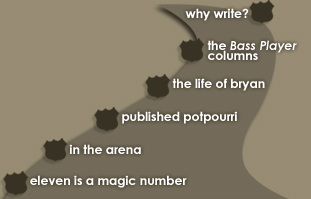
 |
|||||||||
|
|
|||||||||
| Sign up for BellerBytes, the official (and private) Bryan Beller e-newsletter. Just click here to sign up. Do it, OK? | |||||||||
|
Column
#18: Keep The Change Someone once asked me, "What would you write about if you had only one column left?" It's easier to project the question than answer it. What would you do if the next gig you played was your last? Would you play the same parts, on the same bass, through the same gear, wearing that same "No. 1" stage outfit you keep hanging in that special place in the closet? Wouldn't you at least want to change the kind of strings you use? You know, just get crazy and raise the roof with the medium-light gauge? I was fortunate to have received interesting—usually supportive, sometimes hostile—e-mail responses to the column over the past three years. Many readers asked me, "How can I get better as a player, and how I can I progress in my career as a bassist?" (This implies that I somehow know the answer because…well, I have no idea why.) My response was always the same. I'd ignore the second half, and to the first half I'd say, "Learn music by ear off records—as much as possible." An ear that can quickly pick up what you're hearing is the greatest musical asset of all, bar none, and it's a skill that can be honed to a razor's edge. But here's my belated answer to the second question: Change something. How many different basses have you played in your life? By that I mean did a session with, did a gig with—really played. I'm guessing it's fewer than ten. The quest to find the one "perfect" bass for you might just be limiting your scope and creative possibilities. I didn't discover key elements of how my fingers react to certain kinds of instruments, neck action, string tension, and body weight until my late 20s. You may have a bass you use more often than others, and that's fine. But next time, take a different bass to the gig rather than that main axe. Don't ask why. Just do it. How about your amp? You love it so much you'd rather have it repaired for the seventh time than have to try to find "your sound" on a different set of EQ controls. It's okay, I understand. You don't have to be ashamed. But it's time to conquer the fear of the unknown. Borrow a friend's amp, even if it's one you just know doesn't sound good. Just so long as you haven't used it before. And when you get to the gig, set up on the opposite side of the stage, if for no other reason than to watch the other players look at you and think, Okay—what's going on here? Change your own bass lines. Of course there are set parts to play, and you know when you have to play them. But then there are those other moments, where you have a little space, and there's this one really cool lick you love doing because it's just the best lick ever and there's no way any other lick could work better than this little piece of musical magic you're going to keep giving to the universe every time the bridge heads into the guitar solo on this one song. I believe you. Play something different anyway. Subverting something that "works" won't always be successful. Success or failure isn't the point. If the change results in something you happen to like, you have two competing options, both good in their own ways. If it goes south on you, then you've learned something new, or at least gained a different perspective on why you do what you do. So what if it gets a little sloppy in the process? Creativity isn't supposed to be mathematical. Make a mess every once in a while. New York Times columnist Nicholas Kristof, paraphrasing a famous line from the film The Third Man, best summed up what I'm trying to say: "Thirty years of noisy, violent churning under the Borgias in Italy produced Michelangelo, Leonardo da Vinci, and the Renaissance, while 500 years of peace, quiet, and harmony in Switzerland produced the cuckoo clock." Now, I've got nothing against good chocolate and expensive timepieces, and I'm certainly not advocating the Machiavellian excesses of the Borgias (talk about off-topic; get thee to an Italian history book). But what was your last year like? Noisy Italy, or quiet Switzerland? This isn't easy. People generally don't change things around just for the hell of it. Routines make people feel like they're in control, a powerful incentive not to change. I'm no exception. In fact, those who know me will likely wonder what foreign spirit hijacked my brain and produced this column. I write lists and live by them. I horizontally arrange my remote controls on my desk—by order of height. I have a diagram inside my pedalboard case showing which instrument cable goes where. And, yes, I have my favorite licks in songs, and I love them so dearly that it pains me to alter them by so much as a fingering. But I try. And luckily for me, I'm surrounded by others who inspire the kind of routine-smashing, creativity-sparking change I'm trying to describe. If you can't do it yourself, get near others who can. Inevitably they'll rub off on you, and something—good, bad, perhaps both—will happen. Change
something. Chances are you'll grow faster as a bassist, a musician…and
a person. * * * * * You may be thinking that in the spirit of his high-minded, philosophical take on musical creativity, this writer voluntarily stepped down from his esteemed position as a Bass Player columnist in search of a more enriching literary outlet. In fact, nothing could be more untrue. Upon notifying the columnist of his decision to discontinue Learning Curve, BP Editor Bill Leigh had to endure an unpleasant, lawyerly harangue from said columnist. Why would Bill do such a thing? After nearly ten minutes of bobbing and weaving, he finally blurted out his true rationale: "I just wanted to change things up." Oh, well, why didn't you just say so? By Bryan Beller, copyright 2003 United Entertainment Media. Reprinted from the January, 2003 issue of BASS PLAYER. Reprinted with permission from BASS PLAYER. For subscription information, please call (850) 682-7644 or visit www.bassplayer.com |

|